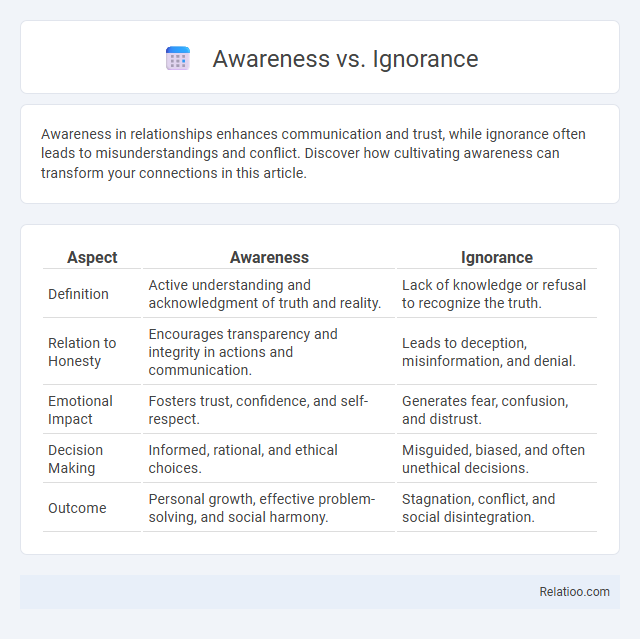Awareness in relationships enhances communication and trust, while ignorance often leads to misunderstandings and conflict. Discover how cultivating awareness can transform your connections in this article.
Table of Comparison
| Aspect | Awareness | Ignorance |
|---|---|---|
| Definition | Active understanding and acknowledgment of truth and reality. | Lack of knowledge or refusal to recognize the truth. |
| Relation to Honesty | Encourages transparency and integrity in actions and communication. | Leads to deception, misinformation, and denial. |
| Emotional Impact | Fosters trust, confidence, and self-respect. | Generates fear, confusion, and distrust. |
| Decision Making | Informed, rational, and ethical choices. | Misguided, biased, and often unethical decisions. |
| Outcome | Personal growth, effective problem-solving, and social harmony. | Stagnation, conflict, and social disintegration. |
Defining Awareness and Ignorance
Awareness is the conscious knowledge and perception of your surroundings, thoughts, or facts, enabling informed decisions and actions. Ignorance refers to the lack of awareness or understanding, often resulting from missing information or unwillingness to learn. Recognizing the difference between awareness and ignorance is crucial for personal growth and effective communication.
The Psychology Behind Awareness
Awareness in psychology involves conscious recognition and understanding of internal states and external environments, fostering better decision-making and emotional regulation. Ignorance, characterized by a lack of knowledge or awareness, limits cognitive processing and hampers personal growth, often resulting in repeated mistakes or poor judgment. Your ability to cultivate awareness enhances self-reflection and adaptive behavior, essential for mental health and effective problem-solving.
The Consequences of Ignorance
Ignorance often leads to poor decision-making, resulting in negative outcomes such as health risks, economic losses, and social conflicts. Awareness enables individuals and communities to recognize potential dangers and opportunities, fostering proactive behavior and informed choices. The consequences of ignorance include missed opportunities, perpetuation of misinformation, and increased vulnerability to exploitation and harm.
Factors That Promote Awareness
Factors that promote awareness include education, access to information, and critical thinking skills, which empower individuals to recognize and understand complex issues. Exposure to diverse perspectives through media, social interaction, and cultural experiences enhances cognitive recognition and reduces biases. Consistent engagement with factual data and reflective practices strengthens the ability to differentiate between ignorance and informed awareness.
Common Causes of Ignorance
Ignorance often stems from limited access to information, insufficient education, and cognitive biases that distort understanding. Your exposure to outdated or misleading sources can reinforce misconceptions and hinder critical thinking skills. Addressing these root causes promotes awareness by encouraging curiosity, open-mindedness, and continuous learning.
The Role of Education in Bridging the Gap
Education plays a crucial role in bridging the gap between awareness and ignorance by providing access to accurate information and critical thinking skills. Your ability to recognize and challenge ignorance improves as education fosters understanding, empathy, and informed decision-making. Empowering individuals through education helps transform ignorance into awareness, promoting social progress and personal growth.
Awareness in the Digital Age
Awareness in the digital age involves recognizing the impact of digital technologies on privacy, mental health, and information consumption, enabling individuals to make informed decisions and engage responsibly. Advanced digital literacy empowers users to discern credible sources, combat misinformation, and maintain digital well-being amid rapid technological change. Promoting awareness enhances societal resilience, fostering a culture of critical thinking and ethical digital behavior essential for navigating the complexities of modern digital environments.
Ignorance and Its Impact on Society
Ignorance, defined as the lack of knowledge or awareness, significantly impacts society by fostering misunderstandings and perpetuating stereotypes that hinder social progress. Your ability to make informed decisions is compromised when critical information is overlooked, leading to social divisions and increased vulnerability to misinformation. Addressing ignorance through education and open dialogue promotes collective growth and strengthens community resilience.
Strategies to Cultivate Awareness
Cultivating awareness requires intentional practices such as mindfulness meditation, reflective journaling, and active listening to enhance self-awareness and emotional intelligence. Implementing regular self-assessment and seeking diverse perspectives can reduce ignorance by broadening understanding and fostering critical thinking. These strategies create a foundation for informed decision-making and personal growth by bridging the gap between awareness and ignorance.
Overcoming Ignorance for Personal Growth
Overcoming ignorance is essential for personal growth as it fosters self-awareness, critical thinking, and continuous learning. Embracing awareness allows individuals to challenge preconceived notions and expand their understanding of themselves and the world. Cultivating knowledge through education and reflection transforms ignorance into informed action, driving meaningful development.

Infographic: Awareness vs Ignorance
 relatioo.com
relatioo.com